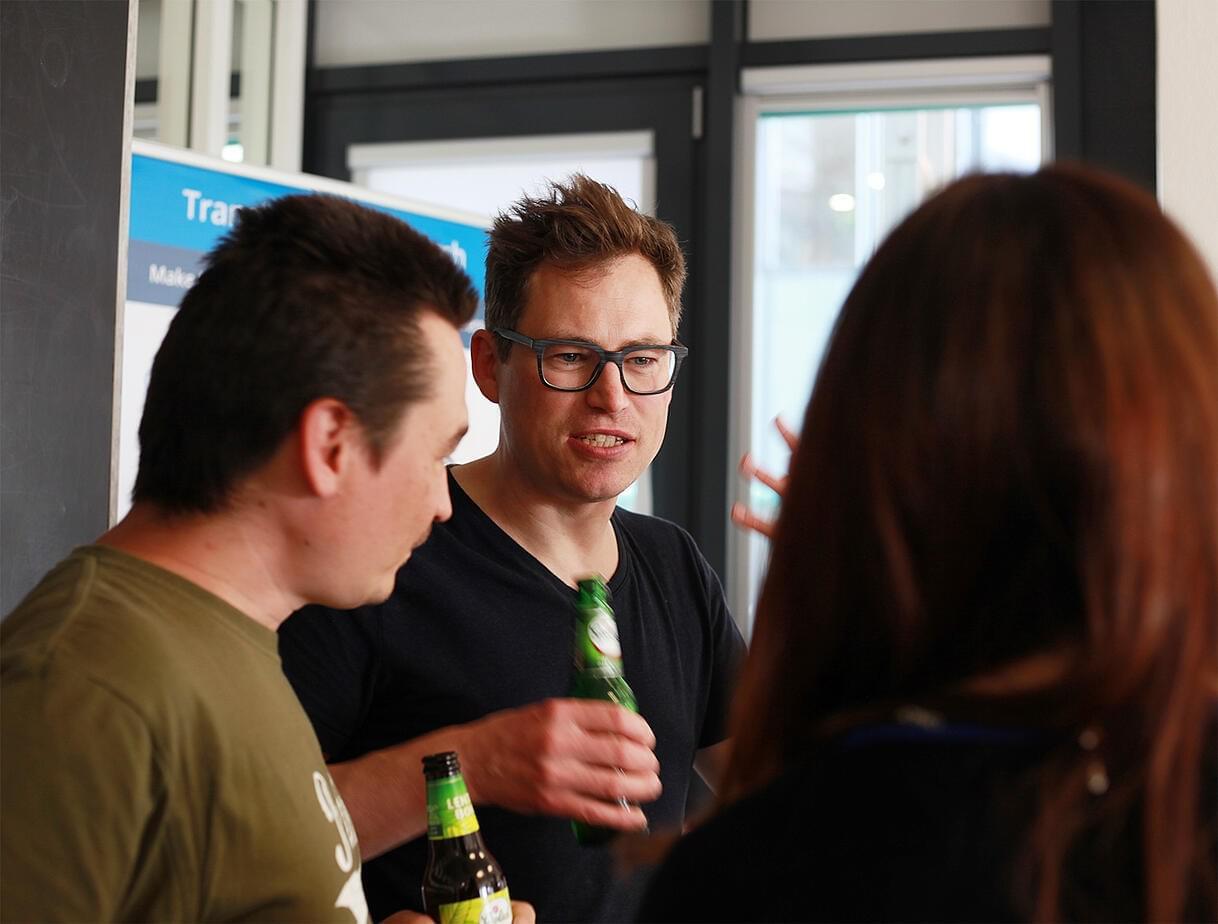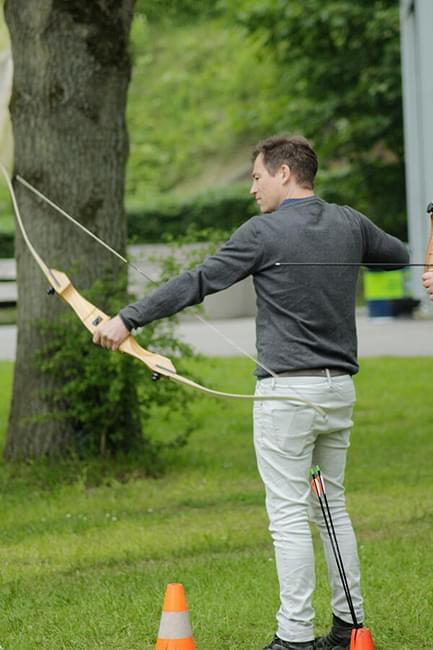Meet software engineer Pim van Nierop (45).
Pim joined The Hyve in November 2018 after a career of some twenty years in academia. As part of the Cancer Genomics team, he develops new features or improves existing ones for cBioportal, the open-source platform that cancer researchers in academia and in pharmaceutical companies use to store and analyze cancer-related patient and genetic data. In the past months, Pim has worked on the development of a new visualisation feature for data-analysis in cBioportal.
Here is his story.
Can you tell me about your background?
At Utrecht University, I studied Medical Biology and specialised in Molecular Biology. This education has prepared me for fundamental research in the Life sciences. By the end of my studies, I was offered a PhD position at the Centre for Neurogenomics and Cognitive Research (CNCR) at the VU in Amsterdam. This institute focuses on the central nervous systems from genetics to behavior. For my doctoral research, I identified neurotransmitter receptor subunits in the brain of the freshwater snail Lymnaea stagnalis that my department used as model organism at that time. After my PhD, I stayed on at the institute as a postdoc in structural biology. My project there was aimed at solving the 3D protein structure of neurotransmitter receptors.
Around this time, I also became fascinated by programming. I was playing a computer game that you could program in, and I got involved with a community that made all kinds of extensions to this game. I liked it so much that I told my professor: I’m leaving, because I want to do scientific programming. His response was that I could stay on and develop software used in the proteomics facility of the CNCR where protein samples were analyzed by mass spectrometry.
So, I started working in that lab where I used my programming skills to develop pipelines for the analysis of proteomics datasets. I also performed data analysis in projects that investigated patients with neurodegenerative diseases. The Nederlandse Hersenbank (Dutch Brain Bank) has collected clinical and genetic information from these patients and taken brain tissue samples. Our department would characterize the protein content present and identify proteins that distinguish neurodegenerative diseases.
In this period, I also got involved with the Industry Alliance Office of Amsterdam Neuroscience, a public-private partnership where pharmaceutical companies fund fundamental research at the university. In return, the company gets exclusive access to the study data before publication of the results in a scientific journal. For several years, I coordinated research projects that were running under this scheme. Still, I wanted to spend more of my time programming. So, when I got the opportunity to develop a medical app with a company that two colleagues at the institute had started, I took a six-month sabbatical and programmed the app. It’s not currently in use anymore, but I enjoyed the process of making it very much.
Anyway, after this sabbatical I continued my coordinating work in neuroscience again. For the past three years, I worked on the Synapse Gene Annotation initiative (SynGO) that was recently published in the journal Neuron. In this project, we annotated all genes and proteins involved in function of the synapse, the site of communication between nerve cells. By the end of that project, I had been working in Amsterdam for almost twenty years. I had been involved in many different projects. Yet again, the thought surfaced: I want to do more programming. That’s why I decided to spread my wings.
How did you get to know The Hyve?
While browsing LinkedIn, I saw Julia Kurps’ profile. I had supervised her when she was a PhD student and saw she was now working as a Business Analyst at The Hyve. When I read up on the company I realized: This is exactly what I’m looking for. A commercial company supporting fundamental biomedical research. Besides, the office was just a ten minutes bike ride from my house. So, I sent in an open application. It was a bit scary, as getting a job at The Hyve meant I would have to leave the VU.
The past half year at The Hyve has been quite intense. I didn’t do much high-level programming in the past few years, so everything is new and requires extra effort. There is not a moment that I think: Oh, that’s a piece of cake. At the same time, I like to be challenged and learn new things. In that sense, the job is exactly what I wished for.

What do you do at The Hyve?
I’m working on different projects within the Cancer Genomics team. Some are small-scale, some are big projects. Usually, we get assigned a certain amount of time to build a new feature or develop software. Since The Hyve does not own software but only supports open-source products, we first need to check with the community around the open-source software if they are willing to adopt a certain feature and maintain it or consider it beyond the scope of their product, meaning they do not want to adopt it. Once it is clear we can develop a certain feature, we need to identify how to incorporate this in the existing framework. Every programming job I do gets closely scrutinized. First colleagues will check my work. When they think it’s fine, I submit it to the open-source community. They will also have a close look at the code to check if the implementation is correct and meets their coding standards. When they approve, the feature will be incorporated. When I just started my job, I evidently made lots of mistakes but I learned a lot from these reviews and quality checks.
I have also taken it upon me to supervise a master student in Bioinformatics from the VU who is doing his internship at The Hyve. I like this part of my job as it makes my work more varied.
What do you like about your work at The Hyve?
The atmosphere is great. In academia, you work a lot with young people: master and PhD-students. Besides, it’s a very international environment. I was afraid to lose that dynamic atmosphere joining The Hyve, but it turned out to be a company with people from all over the world who are highly motivated. They all earned an academic degree, decided to leave academia and at the same time like to work in an environment that is closely linked with the academic world.
At The Hyve, I also feel appreciated as an employee. The company takes good care of us. I’ve gotten used to it by now but compared to the university environment I feel completely pampered. It’s in small details, such as a bowl of fresh fruit on the kitchen counter. Our work requires a lot of screen time, but our health is being minded. For example, there are desks that you can both sit and stand at, and you can exchange your desk chair for an exercise ball.

Coming from an academic background, the efficiency of team meetings was a bit of a culture shock for me. Every morning our team discusses for about 10 minutes the plans for that day and if there are issues to resolve. There is a lot of communication going on. It’s just that the meetings are much more efficient than at university. No lengthy discussions between two or three people, while the rest of the team just sits there wasting their time. I had to get used to it but I really like this efficiency.
Can you mention an exciting development in your field?
The genomics field that we’re operating in, is constantly progressing. The software feature requests that we get are linked to developments in the field. Take for example single cell analysis. Previously, scientists would analyze gene expression in a dish full of cells or in a tissue sample. This new technique allows you to profile gene expression cell by cell. The principle has been scientifically proven in the past few years and now everyone wants to work with single cell analysis. This technique generates a lot of data. So, as a result, we get the request to adapt the existing tools for this novel technique. I like that as a software engineer, I’m still part of major scientific developments in the field.
What do you like to do when you're 'off-duty'?
In the evenings, I like to take out my racing bike for a ride. Or I like to play computer games. At the moment, though, taking the kids to sports clubs and such activities take up a considerable amount of my time.


